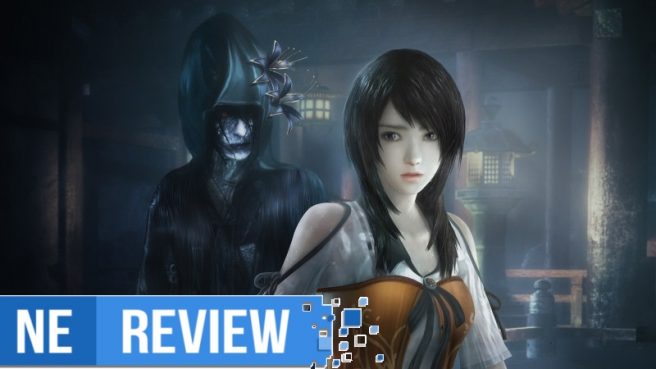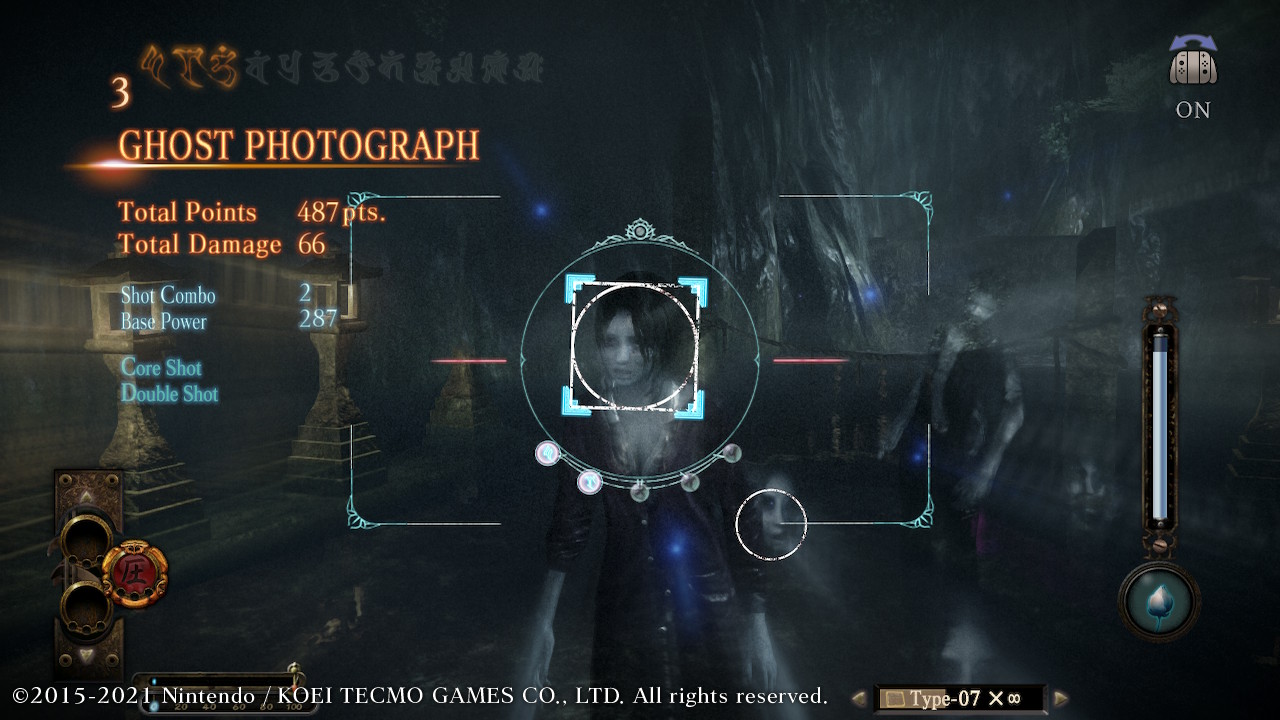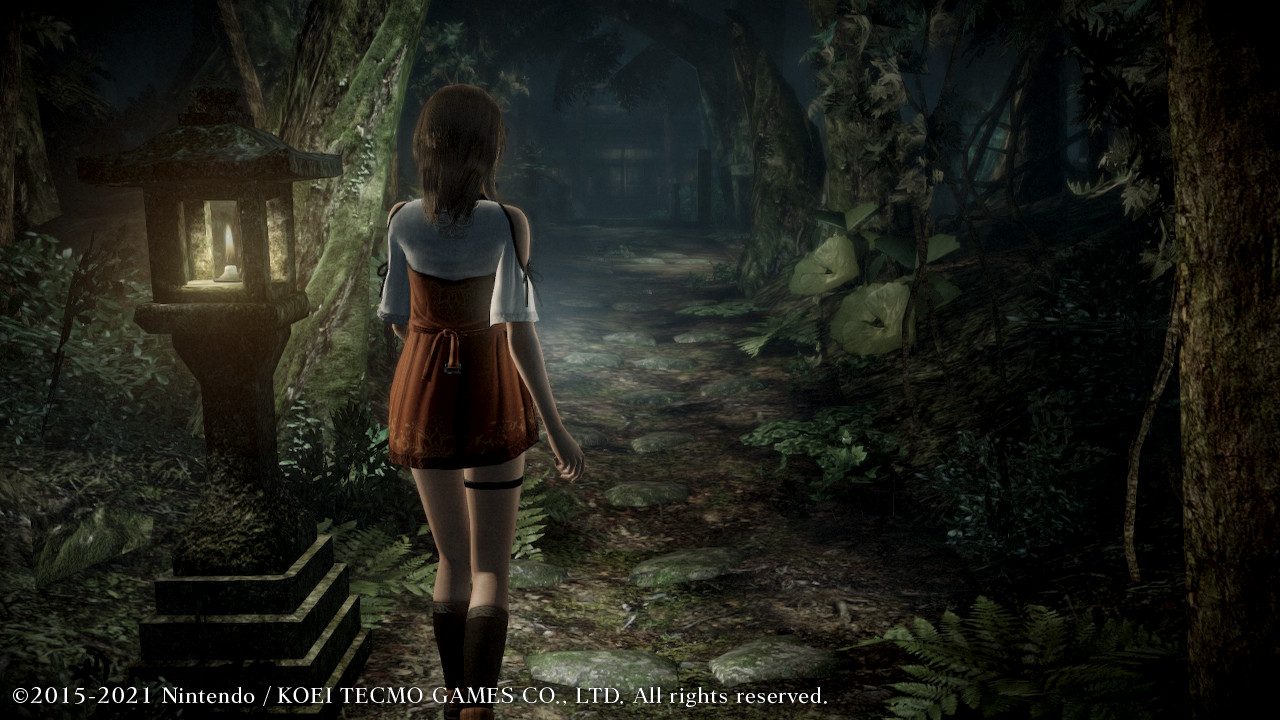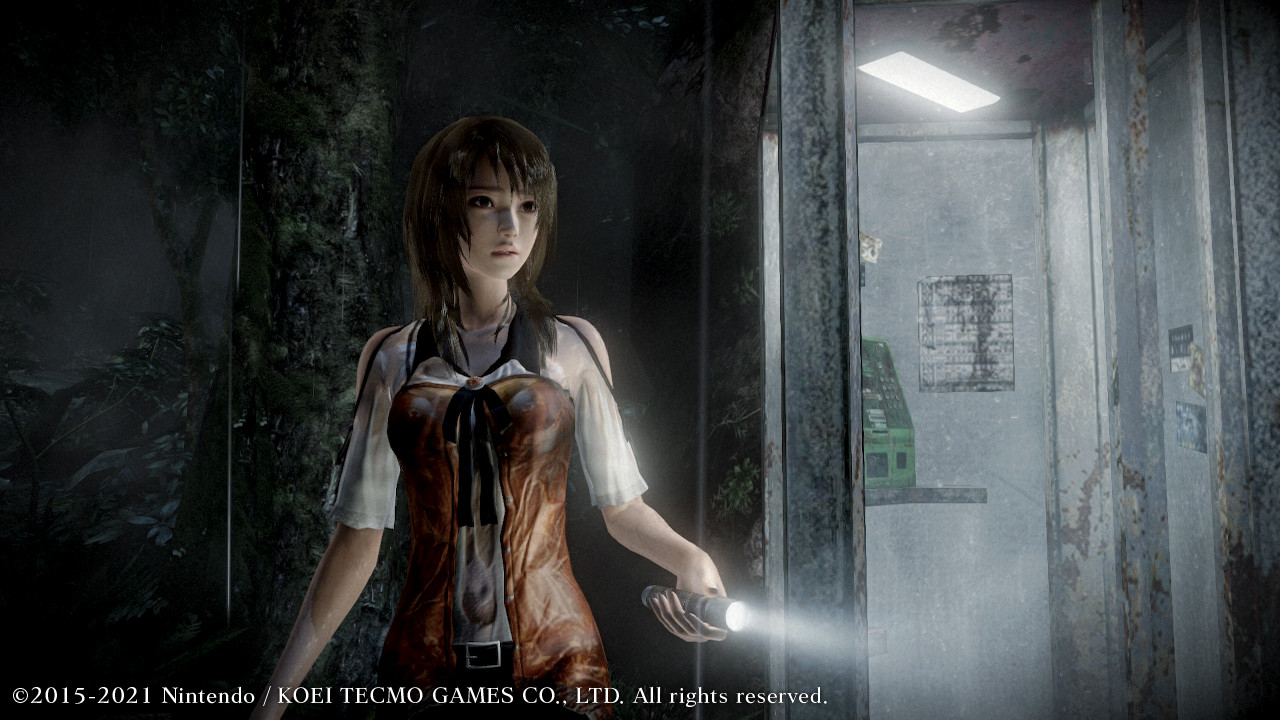[Review] Fatal Frame: Maiden of Black Water (Switch)
System: Switch
Release date: October 28, 2021
Developer: Koei Tecmo
Publisher: Koei Tecmo
Perhaps the only thing scarier than Fatal Frame: Maiden of Black Water – the 2014 entry in Koei Tecmo’s long-running series of horror games about photographing ghosts – is how much time it took for this game to come to modern platforms. Quickly falling out of the spotlight upon the rapid decline of the Wii U, I was cynical about its prospects of being ported to the Switch and thus was pleasantly surprised to see it announced for current consoles earlier this year. But despite possessing a setting and tone that feels special compared to modern day ghost stories, Maiden of Black Water’s deep reliance on the versatility of the Wii U GamePad left me curious to see how it would fair without its second screen. Fortunately, Maiden of Black Water remains a darkly compelling experience that all horror fans owe it to themselves to experience – even if it feels rougher around the edges than it did originally.
In my experience, horror is one one of the more challenging genres to critique due to the high level of variance in what “scary” means to different people. Generally, games that attempt to use copious gore or jump scares, for example, do little to unsettle me and can often be bizarrely comedic. Fatal Frame is ostensibly a series about ghosts – something that in of itself I generally don’t’ find overly frightening – but Maiden of Black Water wracked my nerves more than pretty much any other horror game I’ve played. It excels in building dread, creating a sense of bleak and inescapable hopelessness – something that’s deeply relatable to many people. This is a game in which people lose everything simply because forces beyond their understanding view them as tools that can be manipulated and destroyed. There are ghosts, sure, but their presence is grounded in reality – to the credit of the game’s copious lore and restrained storytelling.
Maiden of Black Water is set primarily on and adjacent to Mt. Hikami, a towering landmass in the rural countryside of Japan that has a centuries-long history of bringing death to those who visit it, and even those who watch the sun set behind it. It’s a place that seemingly lures people to their own demise quite frequently (and graphically – be warned), and yet its presence in the lives of those who live near it has a semblance of normalcy about it all. The only reason Yuri – the game’s main protagonist – gets involved is because the stakes become personal to her early on, after a friend of hers goes missing at the same tine as another disappearance. And so, for the next fourteen chapters, you guide her (and a handful of others) through the labyrinthine forests and abandoned structures of Mt. Hikami as she seeks both answers and peace from the spirits who seek to destroy her.
You’ll do this slowly, though – sometimes much too slowly. This isn’t me being impatient, as I have no problem with a game that progresses less rapidly as long as it does so deliberately. Maiden of Black Water, however, does not accomplish that balanced pace. Firstly, characters move with all of the finesse of an eighteen-wheeler. Not only do they walk and “run” ridiculously slowly considering the precarious situations they are often experiencing, getting them and the third-person camera to turn and face the way you want to look or move is an exercise in frustration. It doesn’t feel like this is trying to be a tribute to old-school style controls, either – it just feels poorly executed.
The story itself also progresses at a snail’s pace for seemingly no reason than to pad out the game’s length. You’ll visit the same handful of environments many times over this game’s 15-20 hour runtime, often for plot reasons that feel contrived at best. This is a game in which characters go missing on Mt. Hikami all the time, but when a character you just rescued from certain death gets lured back to basically the same location one or two episodes later for the exact same reason, the premise loses a lot of its excitement in that moment. That’s not to say that these locations aren’t worth experiencing – they’re remarkably detailed and realistic facsimiles of Japan’s natural scenery and architecture, and are fascinating to explore the first time. But by the third time, I was considerably less thrilled about doing so.
I’m also frustrated by the remarkably poor performance of this game in docked mode. While everything looks crisp and runs smoothly in handheld play, connecting the Switch to the TV turns any outdoor environment into a choppy mess. It was actually a bit shocking – even when I was standing still, doing absolutely nothing – the Switch just couldn’t handle rendering the forests of Mt. Hikami at anywhere near 30 frames per second. This is especially surprising considering how heavily this game often applies a film grain visual effect over everything onscreen (someone could try and argue this was an artistic choice, but I found it far too distracting and inconsistently executed to agree with that notion) Sure, the game has some improved lighting and textures compared to the Wii U release and is generally running at a higher resolution, but if the game can’t run smoothly than what’s the point? I’m hoping this – as well as the small number of game crashes I experienced that booted me to my Switch’s homescreen and lost me considerable progress – will be fixed soon, but as it is its disappointing and makes the game harder to recommend.
Pacing and performance, though, are basically the only real problems I have with Maiden of Black Water, and ultimately I think this game did so many things so well that it was easier for me to overlook its flaws. The biggest surprise for me was its combat, which is simultaneously exciting and nerve-wracking to experience. Sprits can appear as the player explores the environments at pretty much any moment, and the vast majority of them want nothing more than to drag you with them into the afterlife. The only tool you have to combat them is the Camera Obscura, a rare piece of handcrafted photography equipment that’s specifically tailored to stunning and damaging these entities. You do this simply by aligning the ghost in your camera’s viewfinder and pressing the shutter button; much of the challenge comes from tracking the movement of the enemies and keeping them in your sights long enough to snap a few shots. This comes with some caveats, though. It takes time for your camera to load more film between shots, which can potentially leave you vulnerable if you’re not careful. And when multiple ghosts enter the fray, keeping them all at a distance demands a cool head and learning their movement patterns to stun them and deal damage. Landing one shot is all well and good, but wait too long to land another and they’ll regain some of their health, so good timing is crucial for success.
If a ghost lunges toward you to try and grab you, there’s a brief window of time in which you can land a “Fatal Frame” counterattack, which allows you to snap multiple shots of your targets and potentially deal considerable damage. Attacks can also be dodged with good timing, but it takes time to recover and ready your camera again, so there’s risk there as well. Every action in Maiden of Black Water’s combat has a potential downside, and weighing your options in a tense and unexpected encounter is a huge part of what makes combat so enthralling. Encounters with enemies began popping up a little more frequently than felt necessary towards the end of the game, but in general I was having enough fun warding off the ephemeral that I rarely minded. It helps that there’s a decent variety of ghosts to battle, many of which are truly imposing and intimidating, particularly when they corner you in a tight space. Additionally, different lenses and upgrades can be equipped to the Camera Obscura that, say, deal more damage or slow down targets; this adds an extra layer of options to how the player can choose to approach combat scenarios.
Now, when it was originally released, Fatal Frame: Maiden of Blackwater was a true showcase for the ways in which the Wii U’s controller could create unique gameplay experiences. The game put the Camera Obscura into your hands via the proxy of the GamePad controller, which could be moved and rotated around to act as a literal viewfinder into the realm of the dead. It added a different type of immersion to the experience that simply isn’t possible in entirely the same way on current platforms. While the Switch version has no second-screen functionality, it does benefit from motion controls which help replicate the feel of the original experience to a great degree. In handheld mode, it’s possible to rotate the entire console 90 degrees to take vertical, portrait-style photos, and in docked mode the viewfinder can be aimed with simple gyro controls. I generally used the right control stick to get my camera somewhat broadly aligned with my target before using motion controls to refine and perfect my shot to get as much of the ghost in the frame – or ideally, multiple ghosts, to deal more damage at once – and it felt consistently great. I feel the motion controls truly add an extra layer of immersion to the combat, especially when combined with the well-utilized HD rumble and excellent sound design of the camera.
Not all of the combat mechanics felt essential, though. A “wetness” mechanic supposedly makes your protagonist an easier target for ghosts as they get more and more drenched, and while there’s a narrative justification for this I rarely felt its effects in combat. Similarly, while multiple types of film can be discovered and utilized in combat, doing so never felt necessary as everything can be accomplished with the basic, unlimited-use film, albeit perhaps more slowly.
Taking a ghost down completely is always a satisfying feeling, and watching them moan and wither as they dissolve reveals the excellent audio design in Maiden of Black Water. I felt the pain and anguish of these ghosts as they faded away after their defeat, and while their dialogue can be occasionally hokey, the intensity in which these lines are delivered audibly always felt ominous. I can’t quite say the same for the voice acting of the main cast, which didn’t always seem to match the intended tone of the scene, but it’s balanced out somewhat by the relative subtlety of the main underscore which manages help correct many of these scenes. It all just clicks with the amazing art design of this game to create a world that feels dangerous and unpredictable.
Beyond what’s already been mentioned, new additions to this Switch port are limited to mostly inconsequential additions. There are new unlockable costumes – many which are intended to be somewhat provocative – to replace the Nintendo-themed bonus attire in the original release, but I frankly couldn’t care less about this. I just have no desire to play sexy dress-up with characters who are dealing with life-altering trauma, but if that’s your particular jam then there’s probably something here for you. Similarly, there’s a new photo mode that’s available, and while I’ll admit it’s fairly comprehensive it didn’t really add much to the experience for me – especially considering there are many scenes in which its not accessible to use.
The Verdict
While I hesitate to give a full recommendation to the Switch version of Fatal Frame: Maiden of Black Water – performance in docked mode is disappointing in its current state, to say the least – this game managed to draw me in so deeply into its world and gameplay that I was able to enjoy the experience regardless, and I think that’s worth something. Make no mistake: Maiden of Black Water is a tense, rewarding horror experience with an engaging story and highly satisfying and tactile combat that’s relentlessly special in almost every moment. Its presentation of a slice of rural Japan that’s trapped under the influence of supernatural forces is convincing and unsettling in all the best ways, and if you can look past its poor pacing, there’s an engrossing mystery to be uncovered here. Whatever you do, though… be sure to avoid the Black Water… or it might just be the last thing you do.
Fatal Frame: Maiden of Black Water copy provided by the publisher for the purposes of this review.




